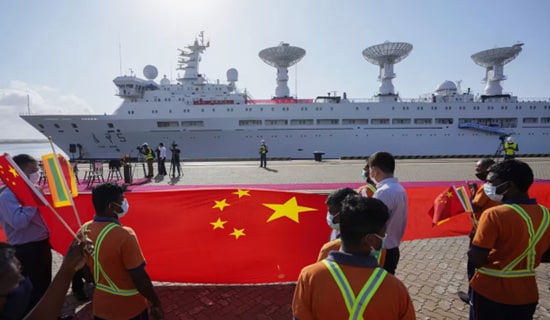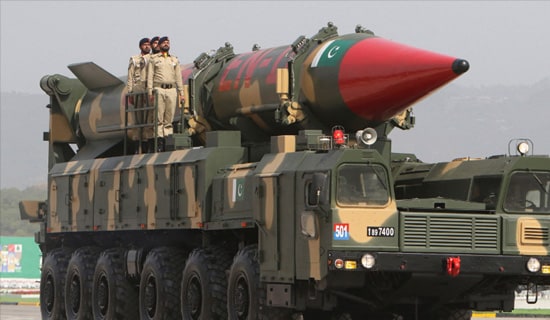Hamas's growing alliance with Russia and China has been a critical development following Hamas's October 7 attack. Russia has gained from the shift in global attention away from Ukraine; China, from the shift away from Taiwan – all eyes, it seems, are fixed on the Israel-Hamas war. Chinese commentators point out that the Hamas-Israel conflict offers China an opportunity for "reunification," meaning invading Taiwan, which "should be initiated immediately" while the U.S. is distracted. Hamas leader Khaled Mashal stated that the Chinese could attack Taiwan in a way similar to Hamas's "dazzling example" of October 7.

Chinese diplomat Wang Kejian met with Hamas political leader Ismail Haniyeh in Qatar on March 17 (Source: Hamas Media Office).
While Russia-Hamas relations are out in the open, China-Hamas relations have largely flown under the radar, though in recent unreported meetings, both have stressed the "close" and "historic" relations between their two peoples. But as China positions itself as a "peace broker" in the war, its active support for Hamas has become more obvious. Immediately after the October 7 attack, China's Foreign Ministry condemned the violence against civilians without specifically naming Hamas; its October 9 statement stressed that China was "deeply concerned over the current escalation of tensions and violence between Palestine and Israel." On October 15, Foreign Minister Wang Yi condemned Israel for going "beyond self-defense." The following day, he added that "the Jewish nation is no longer homeless in the world... [but] the injustice to Palestine has dragged on for over half a century."
China's repeated failure to denounce Hamas – to the disappointment of Israel and the U.S. – was an indication of its true intentions. More serious developments have followed.
Since October 7, the Israeli high-tech industry has encountered difficulties in importing components from China that have both civilian and military uses, while Hamas was found to be using advanced Chinese weapons, including cartridges and rifle sights, automatic grenade launchers, and communications devices. This was despite China's claims that it had "never provided any weapons" to this or to any other conflict areas.
China has also been assisting Hamas with sophisticated cyber activities targeting Israel and spreading antisemitism. On X (formerly Twitter), and on its own social networking platforms such as Weibo – where many users changed their avatar to an Israeli flag with a swastika in the center– as well as via the China Internet Information Center, China expresses support for Hamas and denigrates Israel. China's post-October 7 anti-Israel government disinformation campaign has been spreading antisemitism among Chinese citizens, including with age-old antisemitic tropes. Videos from Chinese social media include one about why Jews must die, and another titled: "Hitler Was Not Wrong." Comments by Chinese readers on posts by the Israeli Embassy in Beijing on Weibo reviled the Jewish state, applauded Hamas, and praised Hitler. Users wrote in Chinese: "Heroic Hamas, good job!"
The U.S. Intelligence Community's 2024 Annual Threat Assessment warned that Chinese "actors have increased their capabilities to conduct covert influence operations and disseminate disinformation." One venue for this is the Chinese-owned TikTok app, used by a majority of U.S. teens aged 13-17, and from which about a third of Americans aged 18-29 regularly get their news – to the exclusion of other sources. Many young adults also use TikTok as their primary Web search engine instead of traditional search engines. This reflects a triumph for the Chinese government in its attempts to sway American public opinion, including on this issue – even to the point of influencing U.S. elections.
SUPPORT OUR WORK

China brings the Israel-Hamas war home, in English, to children and teens, feeding them difficult-to-verify, largely pro-Palestinian "information" about the conflict. TikTok plays a role in inciting ordinary American college kids to hate Israel and in promoting and inciting protests. A widely circulated Chinese video titled "TikTok Has Won Big for Palestine" crowed that the platform "has made a significant contribution to Palestine!"
On Arabic media since October 7, Hamas leaders have discussed their continued meetings with Chinese officials and welcomed the support the organization is receiving from China. These contacts go unreported in Chinese and Western media. Hamas leader Mashal said on October 26, barely two weeks after the attack, that one of Hamas's strategies is seeking "cooperation with superpowers like China and Russia." In November, senior Hamas official Ali Baraka explained how "today, all of America's enemies – or all those shown enmity by the U.S. – are growing closer." He elaborated: "Today, Russia contacts us on a daily basis. The Chinese sent envoys to Doha, and China and Russia met with the leaders of Hamas. A Hamas delegation traveled to Moscow, and soon, a delegation will travel to Beijing."
In another meeting unreported by media, on February 29, Hamas political bureau head Ismail Haniyeh met with Chinese Ambassador to Qatar Cao Xiaolin in Doha. According to Hamas, the two discussed "political and field developments related to the situation in the Gaza Strip," and Haniyeh boasted of the "close relationship" between the Palestinians and the Chinese. A March 17 meeting between Haniyeh and Chinese diplomat Wang Kejian, also conspicuous in its absence from Chinese media, was reported only in a Hamas statement; according to it, Kejian had stressed to Haniyeh that "the Hamas movement is part of the Palestinian national fabric and China is keen on relations with it."
In addition to meetings with Chinese officials, Hamas has received support from the Chinese government in international forums. Khaled Mashal noted on October 31, in an interview on [Turkey’s] state-run network TRT, that "we have friends in the world," specifying "Moscow and Beijing, Russia and China." He added that "their [veto] in the U.N., their political position" is good, but that "they can do more," noting: "Moscow and Beijing are striving for an international balance of power that will abolish [American] unipolarity. Well, this is your opportunity!"
Ma Xinmin, a legal advisor to China's Foreign Ministry, also expressed support for Hamas and its atrocities on February 22 at the International Court of Justice (ICJ) in The Hague. He said that the Palestinians have an "inalienable right" to use force to resist foreign oppression. Israel, he said, is responsible for the conflict because of its occupation and oppression. He added that "in this context," armed struggle is distinct from terrorism and the Palestinian struggle justifies their actions.
Indeed, following the Russian and Chinese vetoes of the March 22 U.S.-led draft resolution on a Gaza ceasefire in the UN, Hamas said in a statement: "We express our appreciation for the position of Russia, China, and Algeria, who rejected the biased American resolution of aggression against our people."
Following Iran’s attack on Israel this past weekend – one is once again reminded of China’s anti-Israel stance. Instead of condemning the attack on Israel, China put out an official statement by its foreign ministry which read, "China calls on relevant parties to remain calm and exercise restraint to avoid further escalation of tensions," and "China calls on the international community, especially influential countries, to play a constructive role in maintaining regional peace and stability."
China's clear support for Hamas and its October 7 attack – which is part of its efforts to take a leadership role in the largely anti-Israel global South – should be viewed through the lens of its China's own interests:
-First and foremost, it sees Israel as the closest U.S. ally, and China does not want a U.S. diplomatic victory.
-China seeks an alliance with enemies of the U.S. – Russia and Iran, along with North Korea. It is no secret that Russia is a "close friend" of Hamas, with possible prior knowledge of its October 7 attack. Iran has been supporting and training Hamas for many years. In addition to North Korea's provision of weapons to Hamas, its leader Kim Jong Un has reportedly ordered officials to support the Palestinians, and Hamas leaders have called it "part of [our] alliance."
For years considered the "most consequential threat" to U.S. national security, China is now working closely with enemies of the U.S. Those concerned with U.S. foreign policy should pay close attention to these developments to study and prepare for any future U.S.-China conflict. First of all, China will support opponents of the U.S., and will also oppose it in the United Nations and in other international bodies. Second, the U.S. will not be able to rely on Chinese goods – high-tech components, medical goods, or anything else – as it does today, as Israel has already discovered. Third, in a situation of hostilities or war, increased cyberattacks and hacking can be expected, as well as an escalation in disinformation and incitement against the U.S. government and military. And fourth, China could be involved in actual attacks on the U.S. In fact, just this month, it held military exercises with Iran and Russia.
China's "peace broker" mask finally dropped completely when Foreign Minister Wang said in a conversation with his Iranian counterpart Hossein Amir-Abdollahian, in the aftermath of Iran's April 13 attack on Israel with over 300 drones and missiles, that this "action" was "limited and was an act of self-defense." He went on to say that "Iran can handle the situation well and spare the region further turmoil" and to call Iran China's "comprehensive strategic partner." Wang's statement proves that China has no problem with future attacks on Israel by Iran, either via its proxies such as Hamas or directly.
China's support for a Hamas victory emboldens Hamas and may encourage the Iran-Russia-China bloc in its efforts to replace the U.S.-led unipolar world with a multipolar world. This will not only boost Russia vis-à-vis Ukraine and China vis-à-vis Taiwan; it will constitute the starting gun for efforts by these major powers to attempt to oust the U.S. from all its bases in the Middle East and Asia. Such a scenario could be a disaster for the U.S. and our allies.
*Steven Stalinsky is Executive Director of the Middle East Media Research Institute (MEMRI).




